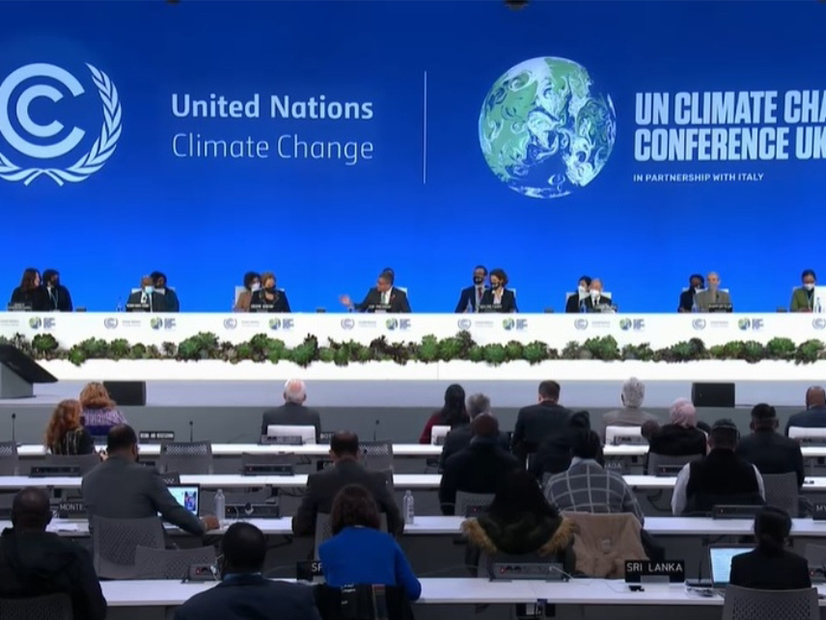
As the U.N. Climate Change Conference (COP26) leadership launched its international gathering on Sunday in Glasgow, environmental advocates were watching what commitments the G20 in Rome would make to limit global warming.
Leaders of the world’s 20 largest economies agreed in a climate communiqué to limit global warming to 1.5 degrees Celsius “with immediate action and mid-term commitments,” Italian Prime Minister Mario Draghi said during the group’s closing press conference Sunday.
For the first time, Draghi said, the G20 countries recognized the scientific validity of a 1.5-degree target and indicated that carbon neutrality should be met by 2050. In addition, he said, the G20 agreed to phase out global public funding and support for non-abated coal-fired plants after the end of this year.
What the G20 signals in terms of clear language around climate priorities will be “very important” for the COP26 process, Vanessa Pérez-Cirera, deputy leader of the World Wildlife Fund International’s global climate and energy practice, said in a press conference in Glasgow on Sunday.
“The G20 has responsibility over 80% of the world’s greenhouse gas emissions while hosting 60% of the population,” Perez-Cirera said. “That means that the carbon intensity of the G20 world is the highest.”
Where the G20 stands on climate will determine how far COP26 can go on gaps in ambition and finance.
Closing the ambition gap will require countries to commit to actions that hold warming at 1.5 degrees.
“We’re on track to a 2.7-degree world,” Pérez-Cirera said.
And closing the finance gap means countries that previously committed to providing $100 billion/year to support developing countries must demonstrate how they will achieve that goal.
“That’s a crucial role, not only because public finance is critical to mobilize action in the developing world, but it’s also a symbol within the negotiations that developed nations are willing to do more and willing to do their part and stick to their commitments,” she said.
The climate communiqué reaffirmed the $100 billion/year commitment for dealing with climate change and made a commitment to scale up financing for adaptation.
Further commitments from the G20 are needed to close what Pérez-Cirera called the “rulebook gap.”
The Paris Agreement rulebook is meant to set out how signatories will pledge to reduce emissions and report their progress, but it is incomplete.
“We know already that it is unlikely that this COP will meet these three gaps, but it is crucial that the G20 sends a signal that it is willing to embark on a new world economy, an economy that is not based on fossil fuel subsidies,” Pérez-Cirera said.
U.N. Secretary-General António Guterres expressed disappointment in the G20 outcome on climate in a tweet Sunday.
“While I welcome the G20’s recommitment to global solutions, I leave Rome with my hopes unfulfilled — but at least they are not buried,” he said.
COP26 Opens
The success of COP26 will depend on the areas of ambition, finance and rules, outgoing COP President Carolina Schmidt, of Chile, said in an opening ceremony speech Sunday.
Before passing the presidency to Alok Sharma, minister of state for the U.K. Cabinet Office, Schmidt appealed to G20 leaders to fulfill their commitments.
“Multilateral processes are not easy; neither are they speedy, but agreements are crucial,” she said.
In accepting the presidency, Sharma committed to promoting transparency and inclusivity and acknowledged the importance of the Glasgow conference.
“We know that this COP26 is our last best hope to keep 1.5 degrees in reach,” he said. “I know that we have an unprecedented negotiation agenda ahead of us, but I believe that this international system can deliver. It must deliver.”
Mexico’s Patricia Espinosa, executive secretary of the U.N. Framework Convention on Climate Change, welcomed Sharma and congratulated everyone involved in the COP process for their perseverance during the pandemic. Officials had postponed COP26, which was due to take place in Glasgow last November.
“We have kept the process going, and we have not let the pandemic stand in the way of addressing the most critical issue facing this generation and those to come,” Espinosa said.
The Paris Agreement, she said, has everything the world needs to mitigate climate change, but it needs “full implementation.”
“Parties must finalize outstanding work under the agreement that has remained unfinished for far too long,” she said. “Every day that goes by without being able to implement the Paris Agreement in full is a wasted day, the accumulation of which has real-world repercussions for people throughout the world, especially the most vulnerable.”
While a recent U.N. report showed that global GHG emissions continue to rise, it also said that emissions are projected to decrease by 2030 for the nations providing a new and updated emissions reduction plan this year.
“But the truth is that we need even more ambitions and all nations on board, especially the highest emitters in the G20,” Espinosa said.


